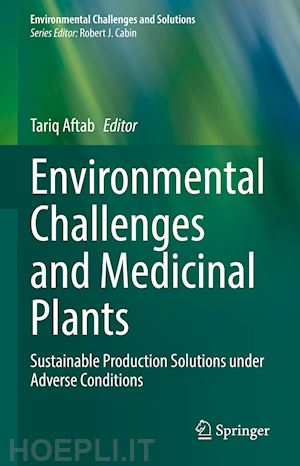
Questo prodotto usufruisce delle SPEDIZIONI GRATIS
selezionando l'opzione Corriere Veloce in fase di ordine.
Pagabile anche con Carta della cultura giovani e del merito, 18App Bonus Cultura e Carta del Docente
Medicinal plants supply the ever-growing needs of humankind for natural chemicals, such as pharmaceuticals, nutraceuticals, agrochemicals, and chemical additives. These plants contain bioactive secondary metabolites, which possess antimalarial, anthelminthic, anti-inflammatory, analgesic, antimicrobial, antiarthritic, antioxidant, antidiabetic, antihypertensive, anticancer, antifungal, antispasmodic, cardioprotective, antithyroid, and antihistaminic properties. Secondary metabolites play a major role in the adaptation of plants to the changing environment and stress condition as they are affected by both biotic and abiotic stress. Humans rely on medicinal plants for various needs since ancient time, and their population still seems enough for fulfilling our demands. However, in the foreseeable future, we will be forced to think about the accessibility of resources for future generations. For these reasons, we must look for alternative sustainable options of resources which can protect these immensely important medicinal plants from various stresses induced by challenging environment. Evolving eco-friendly methodologies and mechanisms to improve these plants’ responses to unfavorable environmental circumstances is important in creating significant tools for better understanding of plant adaptations to various abiotic stresses and sustaining the supply of pharmaceuticals as global climate change intensifies.
One of the great challenges in the near future will be the sustainable production of medicinal plants under increasing adverse effects of climate change. A combination of adverse demographic factors and climatological perturbations is expected to impact food and pharmaceutical production globally. Despite the induction of several tolerance mechanisms, medicinal plants often fail to survive under environmental extremes. To ensure their sustainable production under adverse conditions, multidisciplinary approaches are needed, and useful leads are likely toemerge. However, improving plants' performance under restrictive growth conditions requires a deep understanding of the molecular processes that underlie their extraordinary physiological plasticity.
This edited volume emphasizes the recent updates about the current research on medicinal plants covering different aspects related to challenges and opportunities in the concerned field. This book is an attempt to bring together global researchers who have been engaged in the area of stress signaling, crosstalk, and mechanisms of medicinal plants. The book will provide a direction towards implementation of programs and practices that will enable sustainable production of medicinal plants resilient to challenging environmental conditions. Moreover, this book will instigate and commence readers to state-of-the-art developments and trends in this field.
Current Status of Medicinal Plants in Perspective of Environmental Challenges and Global Climate Changes.- Environmental Challenges for Himalayan Medicinal Plants.- Wild-Growing Species in the Service of Medicine: Environmental Challenges and Sustainable Production.- Favourable Impacts of Drought Stress on the Quality of Medicinal Plants: Improvement of Composition and Content of Their Natural Products.- Adaptation Strategies of Medicinal Plants in Response to Environmental Stresses.- Physiological and Biochemical Responses of Medicinal Plants to Salt Stress.- Horizontal Natural Product Transfer: A Phenomenon Which Is Responsible for the Widespread Alkaloidal Contaminations of Herbal Products.- Effect of Abiotic Stresses and Adaptation Strategies of Medicinal Plants.- Impact of Various Environmental Factors on Biosynthesis of Alkaloids in Medicinal Plants.- Regulation of Expression of Transcription Factors for Enhanced Secondary Metabolites Production Under Challenging Conditions.-Sustainable Use Practices of Medicinal Plants and Environmental Challenges: A Case Study in Pakistan.- Profiling of Trace Elements and Regulatory Landscape of Dietary Herbal Supplements.- Sustainable Economic Systems Against Biotic and Abiotic Stress in Medicinal Plants: Aeroponics, Hydroponics and Organoponics.- Influence of Salinity on the Growth, Development and Primary Metabolism of Medicinal Plants.- Role of Nano-Biotechnology in Medicinal Plant Production.- An Insight into Plant Nanobionics and Its Application to Overcome the Impact of Environmental Stress on Medicinal and Aromatic Plants.- Phytoremediation Capacity of Medicinal Plants in Soils Contaminated with Heavy Metals.- Stress Tolerant Species of Medicinal Plants and Phytoremediation Potential.- Breeding Advancements in Fenugreek for Environmental Stresses.- Conservation Strategies for Medicinal Plants in the Face of Environmental Challenges.- Integration of Medicinal Plants into Comprehensive Supply Chains: The Threats and Opportunities of Environmental Devastation.
Tariq Aftab received his Ph.D. in the Department of Botany at Aligarh Muslim University, India, and is currently an Assistant Professor there. He is the recipient of a prestigious Leibniz-DAAD fellowship from Germany, Raman Fellowship from the Government of India, and Young Scientist Awards from the State Government of Uttar Pradesh (India) and Government of India. After completing his doctorate, he has worked as Research Fellow at National Bureau of Plant Genetic Resources, New Delhi and as Post-Doctorate Fellow at Jamia Hamdard, New Delhi, India. Dr. Aftab also worked as Visiting Scientist at Leibniz Institute of Plant Genetics and Crop Plant Research (IPK), Gatersleben, Germany, and in the Department of Plant Biology, Michigan State University, USA. He is a member of various scientific associations from India and abroad. So far, he has edited 15 books with international publishers, including Elsevier Inc., Springer Nature and CRC Press (Taylor & Francis Group), co-authored several book chapters, and published over 75 research articles in peer-reviewed international journals. His research interests include physiological, proteomic, and molecular studies in abiotic stress conditions.











Il sito utilizza cookie ed altri strumenti di tracciamento che raccolgono informazioni dal dispositivo dell’utente. Oltre ai cookie tecnici ed analitici aggregati, strettamente necessari per il funzionamento di questo sito web, previo consenso dell’utente possono essere installati cookie di profilazione e marketing e cookie dei social media. Cliccando su “Accetto tutti i cookie” saranno attivate tutte le categorie di cookie. Per accettare solo deterninate categorie di cookie, cliccare invece su “Impostazioni cookie”. Chiudendo il banner o continuando a navigare saranno installati solo cookie tecnici. Per maggiori dettagli, consultare la Cookie Policy.